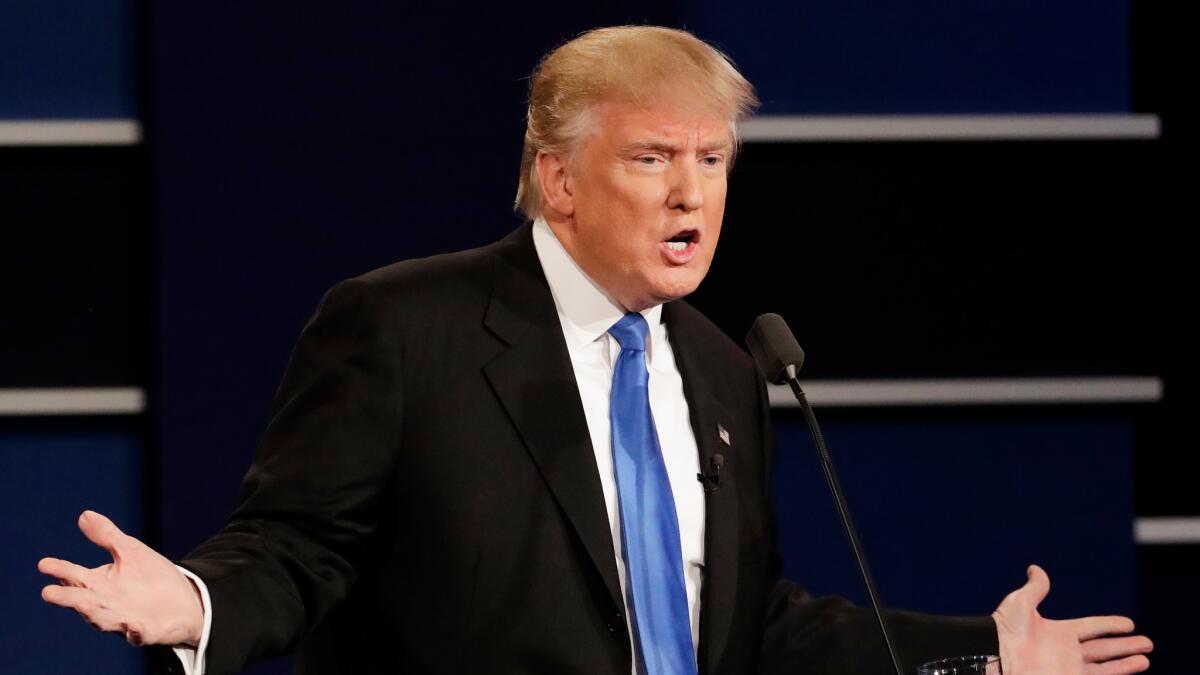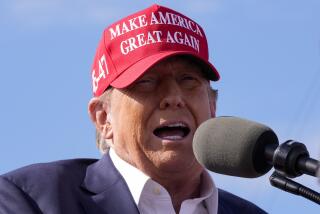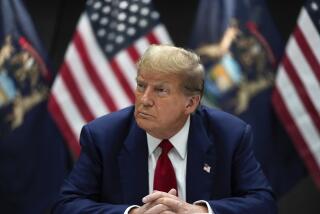Opinion: If Trump paid no federal income taxes, would that inspire more resentment than admiration?

My former boss Michael Kinsley defines a gaffe by a politician as a moment when he or she blurts out the truth. By that standard, Donald Trump had what seemed to be an epic one during Monday night’s debate when commenting about his tax returns.
Echoing then-Senate Majority Leader Harry Reid’s 2012 jibe about Mitt Romney’s unreleased tax returns, Hillary Clinton suggested that Trump wouldn’t release his returns because they’d show he had paid the Treasury nothing. After all, she said, the handful of returns Trump released when he was seeking a state casino license showed that “he didn’t pay any federal income tax.”
Trump then cut in, saying, “That makes me smart.”
The comment caused liberal eyes to light up across the country. Trump all but admitted that his tax returns would show that he’s a champion tax avoider — unapologetically so!
But Trump’s ability to keep his earnings safe from the Internal Revenue Service may not strike many voters as such a bad thing. Just about anyone who pays taxes would like to pay less of them. And as much as liberals like to talk about the wealthy not paying their “fair share” to the IRS — regardless of how large that share may be — the general public may not begrudge those who find legal ways to cut their tax bill because that’s what everyone who files a tax return tries to do.
What they do resent is the ability of wealthier taxpayers to shield income through sophisticated accounting maneuvers that Joe Lunchbucket simply can’t use. There’s something outrageous about people caching money in offshore tax havens or using ginned-up losses on paper to make their actual income look smaller to the IRS. It also violates simple principles of fairness when working-class people pay a higher percentage of their income in taxes than Wall Street millionaires do just because the former’s earnings come from a paycheck and the latter’s from capital gains.
Trump has defended many of the controversial things he’s done, whether it’s been filing for bankruptcy multiple times or paying contractors less than he’d promised, by arguing that he’d simply taken advantage of the rules of the game. In fact, one of his arguments on the campaign trail has been that he’s uniquely qualified to fix the “rigged” system because he’s spent years manipulating that system for his own benefit.
That’s one of the truly disruptive things about Trump’s candidacy. He’s running as both a political outsider — someone with no hand in the failures of government over the last decade and a half — and as an insider — someone who knows where the metaphorical bodies are buried. It’s almost as if he’s a whistle-blower on the elite.
Naturally, it would be different if Clinton could show that Trump was a tax cheat or that he launders his income through shell companies in the Cayman Islands. But she can’t. Exactly how much Trump pays in taxes and how that amount is calculated will remain a secret until he releases his tax returns. He offered Monday to do so as soon as Clinton releases copies of more than 30,000 emails from her tenure as secretary of State that were destroyed ostensibly because they were considered personal, not official business. And that isn’t likely to happen, ever.
Unless and until Trump does make those returns public, his main vulnerability on the tax front is his own proposal to slash federal income taxes on businesses. The version laid out last year would have taxed “pass-through” income from partnerships at 15%, rather than at the rates applied to personal income, which for the highest-income taxpayers is just under 40%. Although Trump portrayed the change as a boon for small businesses, it would be a windfall for Wall Street — and for Trump himself. Most of his income appears to come via pass-throughs from his development partnerships.
His campaign has since given conflicting signals about that proposal. Earlier this month, the Trump campaign told the nonpartisan Tax Foundation that it would exclude pass-through income from the 15% rate. But it also reportedly told the National Federation of Independent Business that pass-through income would be eligible for the 15% rate.
If Trump’s tax plan really would provide a multimillion-dollar boon to the Trump family, that’s something for voters to get worked up about. Granted, it wouldn’t really be a tax cut for Trump if he’s already managed to shrink his tax bill to zero. But that’s something we may never know.
Twitter: @jcahealey
More to Read
A cure for the common opinion
Get thought-provoking perspectives with our weekly newsletter.
You may occasionally receive promotional content from the Los Angeles Times.







